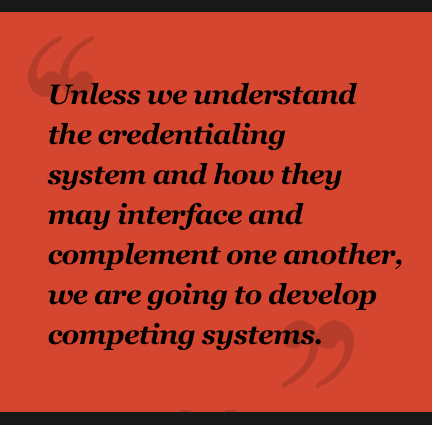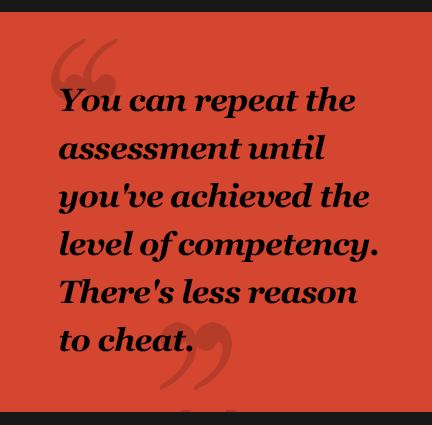[ad_1]
Episode 013 of The Score features Dr. Roy Swift, the Executive Director of Workcred, an affiliate of the American National Standards Institute. He also served as executive director of the National Board for Certification in Occupational Therapy. This appointment followed a 28-year career in the U.S. Army Medical Department, where in his last position, he was chief of the Army Medical Specialist Corps in the Army Surgeon General’s Office with policy responsibility for Army occupational therapists, physical therapists, dietitians, and physician assistants throughout the world.
Host Kathryn Baron (@TchersPet) and Dr. Swift discuss the need for both the academic and business communities to work together to develop credentialed people who are successful both academically and in the workplace.
Below are high points of the conversation between Dr. Swift and Kathryn Baron. Listen to the full episode on Apple, Spotify, and The Score Website.
Note: For clarity we have removed filler words and made minor edits.
Kathryn Baron (03:52): First, I want to ask, what are the one or two most frequent concerns that you hear from employers about how students are being prepared for the job market?
Dr. Roy Swift (04:01): Well, I think there is a disconnect between what is taught and the actual work world. They have the content skills many times, but lack the employability skills of critical thinking, problem solving, teamwork, building working relationships, and the lack of standardization of degrees with the same name, each one having a very different flavor. And so unless you really understand the academic community by which that degree is coming from, you may not have the expectations of what that person really can do.
Kathryn Baron (7:22): I’m wondering then if that disconnect is perhaps part of what leads to academic integrity problems in college and the frustration that you mentioned students often have?
Dr. Roy Swift (07:34): I do think K-12 is the foundational component to success in post-secondary education, in academia and Higher Ed. I believe it is crucial to individuals being able to make the right choices. There are several issues in regards to the system and preparing for success in the post-secondary system. One is helping people understand how to learn to be able to identify resources, to build self-confidence in people. There is a need to move to a more competency-based approach in Higher Ed, that’s transparent and can signal to the work world or the government or whoever that what the person not only knows, but what the person can do. The current transcript is not helpful in this regard. And the reluctance of faculty to move to competency outcomes versus general course descriptions is problematic.
I feel the issue is that the competency approach does put more pressure on the faculty to produce what they say they are producing because it is more transparent, and the assessment tools have to be more precise. The other disconnect is the lack of employability skills. The college is not teaching the behaviors that are expected in the workplace. Something as simple as coming to class on time, participating in class and being an active learner and working in teams often are forgotten.

Kathryn Baron (10:36): You mentioned a paper in an earlier conversation we had that you co-led on the integration of credentials, and I’m wondering if you can just tell us what were the primary takeaways from that and were you at all surprised by anything that you found when you were doing that work?
Dr. Roy Swift (10:54): Yes. Recently, I participated with the Higher Learning Commission, which is one of the national accreditors of universities and colleges. And because they are very interested in looking at the whole issue of credentials and how credentials may be integrated into a higher education system – industry credentials in this regard. The title of the paper was Institutional Accreditation at the Crossroads Drivers for Change, and it had four main themes. One was on how the landscape and pressures on Higher Ed. Employers and accrediting bodies are going to be increasingly pushed to produce a product that is able to function at higher levels, probably because all the technology that is going on today will have to produce a very different kind of individual. Most people think technology will run people out of jobs, but it really looks like that what is going to happen is that it’s going to pressure us to produce people with higher levels of knowledge in the areas of robotics and artificial intelligence.
Dr. Roy Swift (13:26): ….There are over 8,000 industry certifications right now. And every week they develop more and more industry certifications, and it is one in which they can be complimentary.
But unless we understand, like I said at the beginning, the credentialing system and how they may interface and complement one another, we are going to develop competing systems. Which may not be the best way of thinking about these because each credential tends to have a lot of strengths. And so, we should use the strengths of each credential to be able to see how they can be integrated. Our particular group, Workcred, is looking at the embedding of certifications into degree pathways. We think the two can complement one another because certification is about competency assessment.
Dr. Roy Swift (17:14): So, people who are trying to design Higher Education need to take a more systems thinking approach about what is the work world telling them? What is the government telling them? What do students desire? What’s the environment that we should be doing? And so, we take it from the, let’s just say the national system to the state systems, to the academic systems, to the subsystems of provost, deans, faculty, students, and understanding how those layers exist. Unfortunately, too often the K-12 system, which we talked about as being the foundation, is not producing individuals that have the psychological ego strength to face many of the issues that students are facing. And that threat, I think, does cause students to do things that may be unethical, such as cheating.
Kathryn Baron (25:57): …How do you make skills relevant and connect that to competency-based assessments in the system that we have? I mean, is that even possible? What would be the first step to take?
Dr. Roy Swift (26:12): Well, I think the first step is building more precise learning outcomes, competencies, whatever word that people feel comfortable in using, because I think that many times, I hear students talk about the unknown, “Oh, I don’t know what he’s going to ask. I don’t know what the expectations are.” Competency gives more structure to the student as to what the expectations are in this regard. Competency-based assessment is really a more straightforward method of evaluating whether a skill has been achieved. And the students feel more secure when they know what it is that is expected of them, expected in the course, and expected on the assessment.

Kathryn Baron (30:50): ….What are your thoughts on what can be done in the training and workforce development industry to minimize cheating or even to, I don’t know, curb the impetus to cheat itself?
Dr. Roy Swift (31:04): Well, I do think it’s important to go back to transparency, relevance, and competency. I would say those are the three main elements that have to be looked at. I would go back to my thoughts about competency-based education. When it’s about competency, and you can repeat the assessment until you’ve achieved the level of competency, there’s less reason to cheat. Let’s say, okay, I failed. I’ll go back and relearn. That’s a skill that’s taught in the military. I used to teach at the Academy of Health Sciences. It’s called something different now in the army. But one of the things that always happens in the military is they teach, test, reteach, retest. And generally, students are given several times to be able to achieve it because the military believes it’s about competency.
It might take them two or three times while that one person can do it the first time, but it doesn’t mean that the person who took three times isn’t just as good with that competency. So, I think we have to take that sort of an attitude in Higher Ed, instead of this, wow, we’re going to fail you, and that’s it. There’s no other chance in this ring. And it sets up a more feeling of freedom to fail. And don’t we tell people we learn by our failures?
Recommend0 recommendationsPublished in Education, EdTech, Podcast
[ad_2]
Source link
